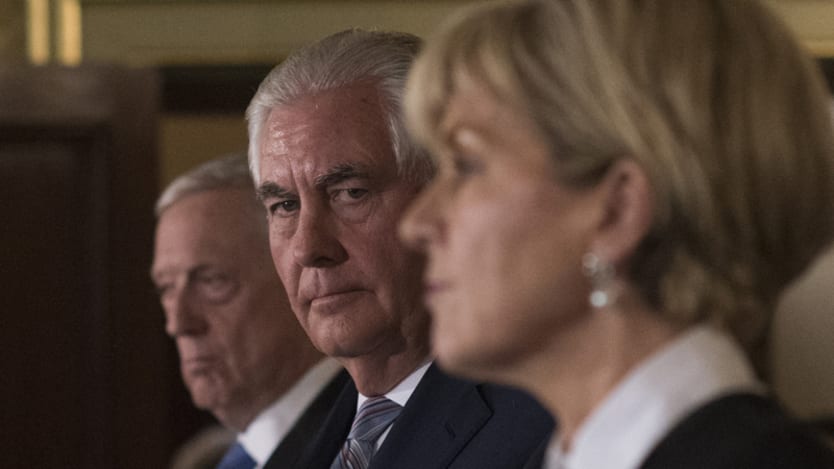
In the United States, in the shadow of a shooting at a congressional baseball practice in Washington, D.C., on Wednesday, the House of Representatives resolved to get on with business, with the Secretary of State testifying at two committee hearings.
During his second day on Capitol Hill, Rex Tillerson defended President Trump administration’s foreign affairs budget proposal and foreign policy priorities. The former oil company executive faced stiff resistance to his message that the U.S. can enhance the effectiveness of its international engagement while cutting foreign affairs spending by 32 percent.
Most representatives — both Democrats and Republicans — expressed concern about what many see as the administration’s de-prioritization of American diplomacy and development.
“Many here are concerned with the hand you were dealt in the budget,” the House Foreign Affairs Committee Chair and California Republican Ed Royce, told Tillerson.
Senators promise rewrite of Trump's foreign aid budget in hearings
In two hearings on Tuesday, United States senators on the foreign relations committee and foreign aid appropriators pushed back against the administration's proposed budget cuts. Republican senators called the proposal “radical and reckless” and “a waste of time.”
Many of them reminded Tillerson that budget authority rests with Congress, not the White House, and just like Senate lawmakers on Tuesday, they often appeared to give short shrift to any possibility that the president’s budget would ever come to fruition.
At several points in both committee hearings, lawmakers pressed the secretary to commit to consulting with Congress as his plans to redesign the State Department and the U.S. Agency for International Development continue to take shape.
“For our partnership to succeed we need to communicate often. Too often, administrations go it alone, as frankly, the last administration did,” said Rep. Royce.
Down to business
After a one hour delay in the wake of the shooting, the House Foreign Affairs Committee conducted an abbreviated budget hearing. Royce asserted that “those who want to use acts of violence to create chaos” would not prevent the legislative body from doing its work. Most lawmakers prefaced their questions for Tillerson with words of support for the victims of Wednesday’s attack.
At the House Committee on Appropriations hearing in the afternoon, Maryland Democratic Representative Dutch Ruppersberger pushed back on Tillerson’s repeated attempts to assure lawmakers that drastic budget cuts would not mean a reduced U.S. diplomacy and development presence.
“You have a lot of experience, and I’m glad you’re where you are … You know budgeting too. Budgeting is about priorities.” Ruppersberger said.
In both hearings, Tillerson objected to the idea that the amount of money a department spends corresponds to its effectiveness. He also argued that the State Department and USAID have failed to adapt themselves to the post-Cold War era.
“I’m a fit-for-purpose guy,” he said.
Lawmakers in the House Foreign Affairs Committee moved quickly away from questions about funding and on to questions about U.S. foreign policy.
Stay up to date on Devex coverage of U.S. foreign policy under Trump:
► Mapping Republican views on aid as budget discussions kick off in Congress
▶ Trump budget thrusts US foreign aid into a political fight
▶ What Trump's budget request says about US aid
▶ As budget negotiations begin, here's where US Congress stands on foreign aid
Karen Bass, a Democrat representing California, pressed Tillerson on the Trump administration’s policy toward Africa. Bass reported that African allies have approached her and “expressed a lot of concern about what direction the country is taking on Africa.”
On U.S.-Africa national security cooperation, she questioned the White House proposal to cut democracy programs and international peacekeeping. On humanitarian assistance to Africa, she criticized proposed cuts to food assistance and global health programs — pointing out that those investments helped prevent the spread of Ebola in a number of countries.
Bass pointed to “tremendous opportunities for U.S. businesses” to invest in Africa, and then wondered why the White House would see fit to eliminate the agencies that help facilitate those investments: the Overseas Private Investment Corporation., the U.S. Africa Development Foundation, and others.
A job to do
Multiple representatives raised concerns about U.S. foreign affairs staffing. Representative Elliott Engel displayed a chart outlining the number of senior positions that remain vacant inside the State Department, with red boxes denoting unfilled jobs. “That’s a lot of red,” Engel said.
“People have not been confirmed, not because of obstruction, but because they haven’t been submitted,” Engel said, adding that the acting officials currently filling in for political appointees should be lauded for their service, but are not authorized to determine American foreign policy.
Tillerson responded that for half of the senior positions still unfilled, potential nominees have been discussed and their names sent to the White House. The secretary blamed the nomination and confirmation delays on the extraordinary amount of paperwork political appointees are required to file.
New York Representative Gregory Meeks, a Democrat, raised concerns about a “freeze” he understood the State Department to have placed on its incoming class of foreign service officers, including for the awardees of some State Department fellowships. Twenty-one percent of the State Department’s diversity hiring has occurred under the auspices of a fellowship, Meeks told Tillerson.
“There is no freeze,” the secretary said, explaining that the State Department has placed a “hold” on its class of “A-100” introductory foreign service officers in order to reconcile a recent uptick in hiring with plans for reductions.
Texas Republican Kay Granger, a house appropriations member and chair of the defense subcommittee, advised Tillerson to make better use of congressional allies in the future.
“I called you over four weeks ago. Never a call back, no one from your staff. Nothing. And all I was doing was offering my help,” Granger said.
Stay tuned to Devex for more news and analysis of what the Trump administration means for global development. Read more coverage here and subscribe to The Development Newswire.
Search for articles
Most Read
- 1
- 2
- 3
- 4
- 5








